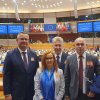On 23 May 2023, during a seminar at the European Parliament, representatives of the Central Mining Institute presented projects worked upon at the Institute that are funded by the Research Fund for Coal and Steel (RFCS). Director Stanisław Prusek and Jacek Skiba, DSc, discussed the goals and principles of project REM: Reduction of methane emissions from post mining goafs to minimise their inflow into VAM, while professor Alicja Krzemień presented projects POTENTIALS and GreenJOBS.
The goal of project POTENTIALS – Synergistic potentials of end-of-life coal mines and coal-fired power plants, along with closely related neighbouring industries: update and re-adoption of territorial just transition plans – was to assess the possibility of harnessing the potential of hard coal mines undergoing decommissioning and their connected coal-fired power plants to stimulate new business activity and create jobs, particularly in mining regions. An analysis performed as part of the project serves to examine business models based on renewable energy, the circular economy and broad-scale energy storage, guaranteeing a sustainable use of resources. This made it possible to determine the areas for stimulating new business activity, particularly in terms of job creation and the economic development of mining regions in transition, as well as to support local policies enabling the development of new or upgraded technologies and business models that would be based on the production and storage of renewable energy. The project was accomplished by an international consortium of institutions from Poland, Germany, Spain and Greece.
The goal of project GreenJOBS – Leveraging the competitive advantages of end-of-life underground coal mines to maximise the creation of green and quality jobs – is to identify optimal scenarios for the repurposing of hard coal mines undergoing decommissioning to develop innovative business models. The plan is to make use of five competitive advantages, which include: mine water as a geothermal resource, the capability to direct power to the grid using existing infrastructure, using waste dumps to establish photovoltaic power stations, repurposing infrastructure to build underground pumped hydroelectric storage systems using liquids with increased density, and using extraction waste to produce dense liquids for the production of soil substitutes for mining area reclamation. Two innovative business models will be developed as part of the project: a Virtual Power Plant and a Green Hydrogen Plant. The Virtual Power Plant is a system of interconnected distributed renewable power generation units, information and communication grids, a management system and market mechanisms. The Green Hydrogen Plant is a system where renewable hydrogen will be produced by electrolysis using mine water and power obtained from renewable sources. The project is worked upon in close cooperation by three European research institutes from Spain, Poland and Germany as well as five industrial partners from Spain, Slovenia and Poland, including the Polish company Węglokoks Kraj S.A.



